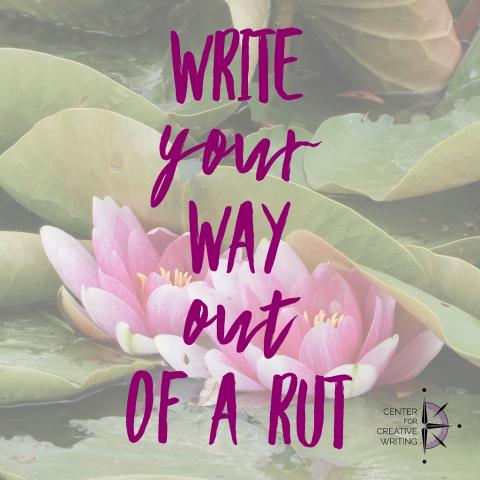
Stuck in a frustrating rut with your story/poem/essay? This post has you covered.
Friends, neighbors and enemies round the world are discovering the hurdles of split focus as we manage our work lives from home. The phrase “work-life balance” feels like a taunt as we are stretched further than we knew possible. And that is whether we have a paying job during quarantine or not. The struggle to be productive is real, and while it is absolutely fine to choose non-production during global crisis, if you are working on that novel, memoir, children's book, or poetry collection, you are likely facing blocks.
There’s a lot on your plate. It’s okay if you’re struggling.
Pre-pandemic, I was working three jobs. The main two have disappeared into the pandemic abyss. My third job involves writing. I get up every morning, make coffee, and sit down to check the various publications that carry my work. I am fortunate to have a considerable body of past writing that is republishable on most platforms, but I also have specific revision guidelines as well as regular deadlines to generate new content. The rise of COVID-19 means the external structure I relied on to support my meeting of deadlines is gone. I’m lucky if I know what day it is, let alone the date. My “morning” has slipped considerably toward noon. I’m eating an average of two meals a day instead of three. Everything is different, except that I still need (and want) to write.
My anxiety is up, my critical thinking skills are down, and the combination results in me stalling repeatedly when it comes time to type. Immediately that nagging voice of self-doubt starts in. I feel my confidence cracking. I want to give up.
Oh, you have that voice, too? Here’s what you can do: instead of hammering away and going nowhere until your writing world cracks and you fall into the void of doubt, wonder why you even try, and burn your laptop in a bonfire, shortcut negative self-talk by writing something completely different.
Turn your attention to a relief project
I call this act of self-preservation a relief project; it’s a life vest in troubled waters, a compass on a convoluted hike with no cell service. It is, in fact, an intentional splitting of focus done for your advantage. Your purpose in engaging a relief project will be to direct your thoughts away from your “stuck” writing. Why? At the risk of sounding like a fortune cookie, walking on a new path will reveal unexpected wonders.
With that said, your relief project might look like you writing in a different voice or character’s point of view. It might be you engaging a completely different genre of writing or art. And that’s ok, even optimal–but how to go about it?
I tend to write on topics that are emotionally challenging. In order to give myself a break, I write a relief project based on a moment of joy. In essence, choose a relief topic which serves to contrast your main project topic. Then, when you get stuck, switch gears from tough writing to light writing, nonfiction to fiction, poetry to painting or comedy to horror. This will help your brain to push your main writing to the background and turn it over passively, ultimately clearing your creative path and allowing you to stay productive.
Because let’s face it: most of the negative self-talk we writers dispense is about how we aren’t getting words on the page. And it’s not just the right words; it’s the word count. It’s possible to serve your writing intentions for a particular project by veering away from that project but continuing to write. Instead of submitting to a closed-door assertion that “I have writer’s block,” steer around the block with a relief project and keep your creative energy connected to action.
Whatever you choose, a relief project is an opportunity to restore balance in your writing practice by relieving the pressure of writing the “right” thing and replenishing your creative energy by focusing on something new.
Writing exercise
First, jot down a few notes about the project you're currently working on, the main one, the one that makes you feel like you're in a rut. What is it about? What is the main tension? What is your main hang-up or challenge in continuing to work on this piece right now? Being thoughtful about where you are will help you figure out where to go.
Now, make a list of opposites. If you identified the main tension of that short story as loneliness, write down "community" or "togetherness" or "belonging" and start a new story that exemplifies a different reality. If your biggest challenge in continuing your memoir is telling the truth about a falling-out with a living relative, write a fictionalized version of that event with the characters as your favorite animal. If your novel is just too unwieldy and you have no idea where to go, take a walk with a notebook and write short snippets about the first five inanimate objects you see, describing them thoroughly, then imagine them coming to life and interacting with one another when you walk away.
It might seem counter-productive to split your focus, but succeeding–and maintaining a writing practice–in our new reality seems to hinge on our ability to develop this skill. You might even be able to apply the concept of relief projects to other areas of life.
Ever use relief projects? How is your writing coming along (or not coming along) during the pandemic? Share with us in the comments!
Related reading: Writers, take up space!
How expressive writing can keep you afloat
The many challenges of writing life maintenance (and how to balance them all)
Want to receive tips and inspiration like this in your inbox every Sunday morning? Join our email list community! You will receive weekly advice, a year’s worth of weekly writing prompts as a FREE download, and be eligible to participate in our monthly photo prompt contest for a chance to share an original piece of writing with our community of over 1,200 subscribers!
